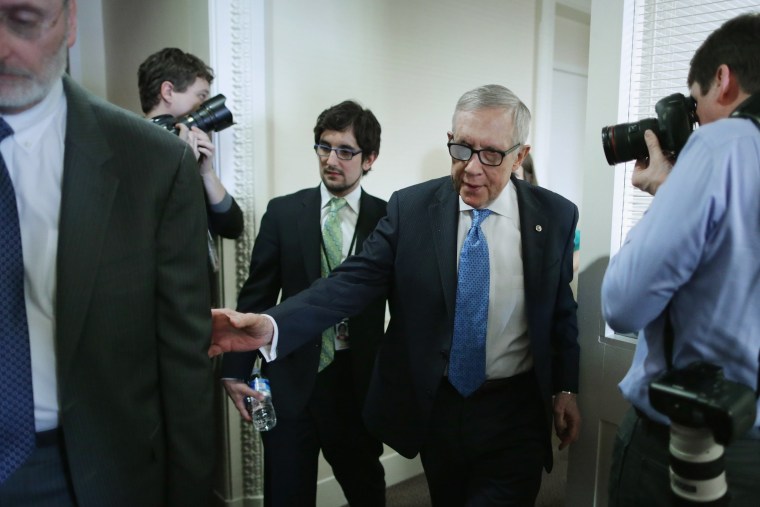Congress was able to temporarily dodge an imminent shutdown to the Department of Homeland Security last week, but lawmakers aren't out of the woods quite yet.
The clock has been reset to four days and counting until Congress faces yet another deadline on funding the critical government agency. And if last Friday's flurry of legislative action is any indicator of what to expect at the end of the temporary delay, it's likely to be yet another mad scramble for congressional leaders.
RELATED: Shutdown averted — for now
The action picked up again Monday with a blocked procedural vote in the Senate. Will Congress be able to pull together a long-term solution after barely squeezing by a temporary stop-gap last week? The clock is ticking.
What’s happening next?
Senate Democrats on Monday successfully blocked a motion to bring DHS funding legislation to conference for both chambers to hash out their differences. The Senate has already passed a bill to keep the lights on at the DHS through September, a measure that notably strips all language to unravel President Obama's executive actions on immigration. The "clean" Senate bill passed with bi-partisan support on Friday, and Democratic leaders want to see that legislation brought before the House. Chances of that happening remain unclear: For Republican leaders, bringing up the clean bill for a vote would signal a final white flag of surrender in their strategy to gut the immigration actions through a DHS funding bill.
Senate Minority Leader Harry Reid said it would be "counterproductive" for Democrats to support going to conference with House Republicans.
"We will not be a party to yet another charade by House Republicans because it would inevitably shut down the Department of Homeland Security and put our nation at risk, and that's an understatement," Reid said from the Senate floor on Monday. "The Senate should reaffirm our bipartisan vote last Friday for a clean bill preventing a shutdown."
As Roll Call pointed out, another option for lawmakers involves an archaic procedural move. It’s a bit of a long shot, but in theory, any House Democrat could take to the floor and bring up the clean bill passed in the Senate as a “privileged resolution.” This would require a simple majority to pass and could send the legislation straight to Obama's desk for his signature.
How’d we get here in the first place?
Republican leaders have vowed to fight "tooth and nail" against Obama's immigration actions, which would offer deportation relief to as many as 5 million undocumented immigrants. Until last week, the strategy was to tie the unilateral measures to legislation funding DHS. (In essence, the argument was: "Want this vital agency funded? Only if the executive actions were killed.") But with the deadline for a DHS shutdown fast approaching, the strategy began to crumble.
RELATED: Obama rips GOP on immigration
Congress last week effectively kicked the can down the road, leaving yet another impending deadline coming again on Friday at midnight. It was a wild race to the finish that lacked much coordination between the two chambers. Originally, House Speaker John Boehner pushed for a three-week funding bill. Though it would only provide temporary reprieve, the three weeks could have bought the Speaker crucial time. He could have had the space to work out differences between House and Senate Republicans, while also keeping an eye on a federal court that could dismantle the immigration actions without Congress having to lift a finger.
Instead, the three-week plan backfired on Boehner and failed to garner enough Republican support. With just hours left until the initial Feb. 27 deadline, Republican leaders cut a deal with Democrats to keep DHS limping for another seven days while lawmakers crafted a Plan B.
So did the deal involve a promise to vote on a long-term solution this week?
Democratic leaders say "yes," Republican leaders say "no."
In a letter to House Democrats ahead of the final vote last Friday, Minority Leader Nancy Pelosi said the seven-day stop-gap would "assure" that the House will vote for a full-funding. But following the passage Friday, it was unclear as to exactly what assurances were made. A spokesman for Boehner swiftly fired back at Pelosi's assertion, a sentiment that House Majority Whip Steve Scalise echoed on Fox News Sunday.
"There is no such deal and there's no such bill,” Scalise said.
It’s entirely possible that Friday evening could bring a sense of deja vu as lawmakers scramble, once again, to avert a DHS shutdown.
Is Boehner’s job on the line?
Republicans currently enjoy one of the largest majorities in the House since the Great Depression. The dramatic strength in numbers was supposed to stave off the chance that intra-party stalemates would derail the GOP agenda. But still, GOP leaders needed to enlist Pelosi's help in order to get even a stop-gap measure passed before the impending deadline. Two months into the Republican-controlled Congress and things don’t look much easier these days for GOP leadership.
The Republican leadership team suffered an embarrassing defeat in failing to pass the three-week stop-gap on Friday, exposing a greater divide between far-right factions of the party and the GOP establishment. The impasse put the spotlight on Boehner's leadership with rumblings that his speakership may be in jeopardy. Boehner himself acknowledged Sunday on CBS "Face the Nation" that it's going to be an uphill battle in uniting Republicans on immigration.
“I’m not going to suggest it’s easy, because it’s not,” he said.
Still, it's not likely that many others within the Republican Party will be gunning for Boehner's job. Rep. Jim Jordan, an Ohio Republican and leader of the Freedom Caucus, said on CNN’s State of the Union Sunday that his coalition will not be trying to oust the speaker anytime soon. “That’s not going to happen,” he said.
